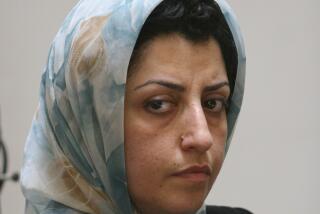L.A. Dancer Convicted of Corrupting Youth in Iran
TEHRAN — A popular Iranian American dancer who returned to Iran for the first time since fleeing two decades ago has been convicted of corrupting the nation’s youth through classes and performances he gave in the United States.
A Tehran court prohibited Los Angeles resident Mohamad Khordadian, 46, from leaving Iran for 10 years, barred him from giving dance classes for the rest of his life and banned him from public celebrations or weddings of non-relatives for three years. He was also given a 10-year suspended prison sentence.
After the judgment Sunday, Khordadian was freed from Tehran’s Evin prison and driven away by a family member. The prison sentence may be imposed at any time if the government deems he has violated the terms of his release.
Khordadian is a classically trained dancer who studied in Iran before the 1979 Islamic Revolution and once headed the Niavaran ballet company in Tehran. Like many artists, he fled after the revolution, fearing that the nation’s strict new moral code would lead to repression or worse.
Still, in recent years his performances were popular here, broadcast into Iran via satellite and smuggled into the country on CD-ROM and video.
At his trial, Khordadian rejected the notion that he was corrupting youth, and he seemed to express bewilderment at the charge.
“Dancing does not incite young people to moral corruption,” Khordadian told the judge at his trial, according to Iranian press reports. He said dancing was his “job” and could be considered a “sport.”
But the judge said he had seen videos of the performances and concluded that the charges were warranted. Khordadian could not be reached for comment Monday and was advised by his lawyer to avoid publicity for a few days. He has 20 days to file an appeal.
“Khordadian is innocent. He has done nothing wrong to deserve punishment. The whole verdict is irrelevant,” his lawyer, Abdolrahman Rasouli, told Associated Press.
Los Angeles’ large Iranian community held on to hope that Khordadian would somehow return to the U.S., said Hooshmand Aghili, a well-known Iranian singer based in L.A.
“All the Persians know his name,” Aghili said. “He was very, very famous. We hope that he can defend himself and ... can get free from [this] sentence.”
Shahram Hashemizadeh, owner of the Los Angeles-based Melli TV network, said several Iranians had called the station to complain about the sentence. Some expressed doubts about returning to Iran because they were afraid they might be arrested as well, he said.
Melli TV, a 24-hour cable and satellite station, often broadcast Khordadian’s performances. The dancer was especially popular during Persian New Year, which is celebrated in March or April.
Hashemizadeh said he wasn’t surprised by the Iranian government’s ruling but was somewhat relieved. “We are very happy that they didn’t kill him,” he said.
After the revolution that toppled the shah of Iran, the newly formed Islamic Republic tried to distance itself from what it saw as the shah’s un-Islamic excesses. Prostitution, which had been legal, was prohibited. Alcohol was banned. Women were required to cover their heads and bodies with loose-fitting gowns in public. Chess, music and dancing between men and women were prohibited.
Since the early days of the revolution, social restrictions have eased, partly because the age of Iran’s population has dropped and reformers have come to power, led by President Mohammad Khatami. But there remains a constant tug of war between hard-liners and reformers, a struggle for power that often manifests itself in the social arena. Khordadian was snared in the most recent tussle.
Hard-liners have reportedly begun a crackdown on what they deem to be depravity, and special police forces canvass the capital to make sure women are wearing head scarves and car music is not played too loud.
“Our patrols are spread across the city to reestablish social order and against all forms of depravity,” Tehran police official Mohammed Mehdi Sadoughi was quoted as saying in the reformist daily newspaper Norouz last month.
At the same time, women are regularly seen wearing relatively stylish red over-shirts instead of flowing black chadors. Some even wear toenail polish and open shoes, something that would have been unthinkable not long ago.
Khordadian, who has a dance school and troupe in Los Angeles, reportedly returned to Iran to visit his ailing father and other relatives. He was arrested in May at Tehran’s airport while waiting for his flight back to the United States.
The judiciary that found him guilty of moral corruption is appointed by the country’s hard-line religious hierarchy. In a swipe at the United States, the court banned Khordadian from leaving Iran to keep him from a “provocative environment that could lead him to repeat the offenses,” according to press reports here.
Khordadian is best known for a belly dance called “Arabic Dance,” in which he wears traditional clothes and takes the stage with two groups of female dancers.
“I did not know teaching dancing abroad was considered as an offense in Iran,” Khordadian told the court shortly after he was arrested.
Times staff writer Anthony McCartney in Los Angeles contributed to this report.
More to Read
Sign up for Essential California
The most important California stories and recommendations in your inbox every morning.
You may occasionally receive promotional content from the Los Angeles Times.









